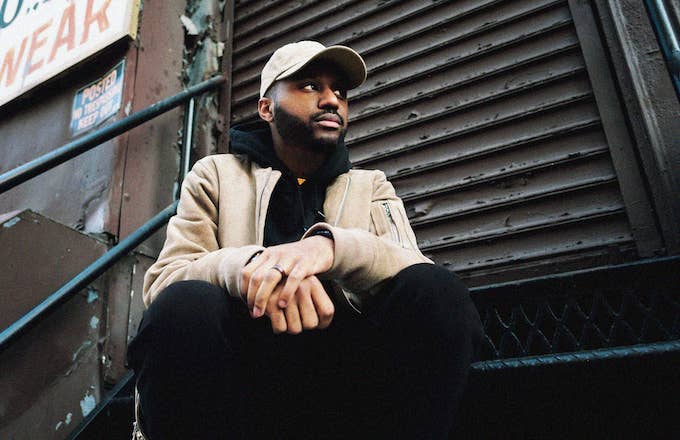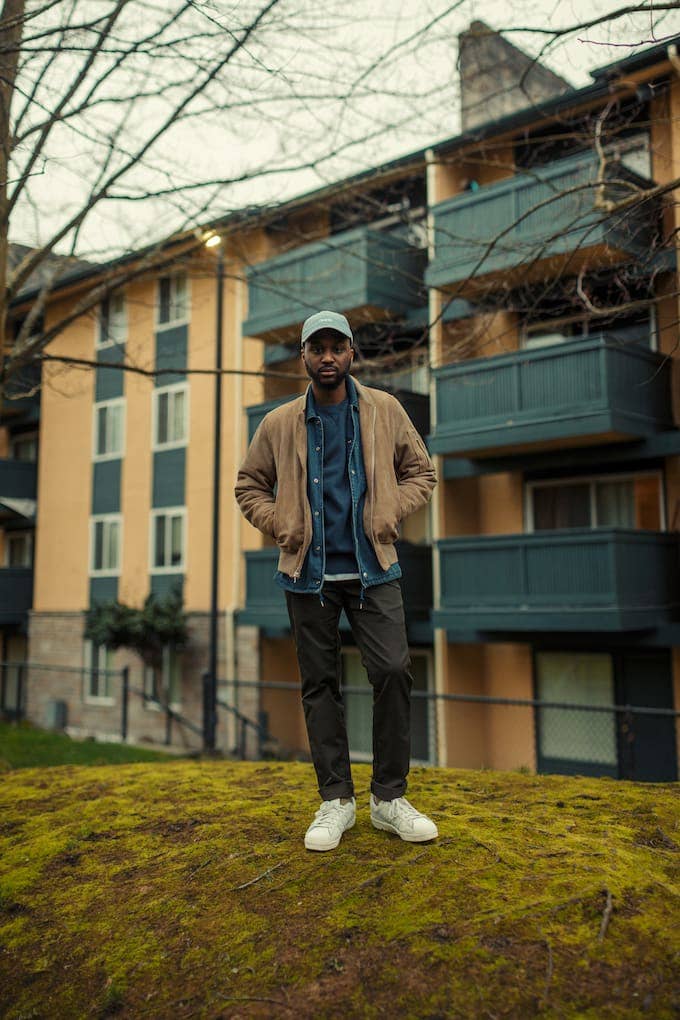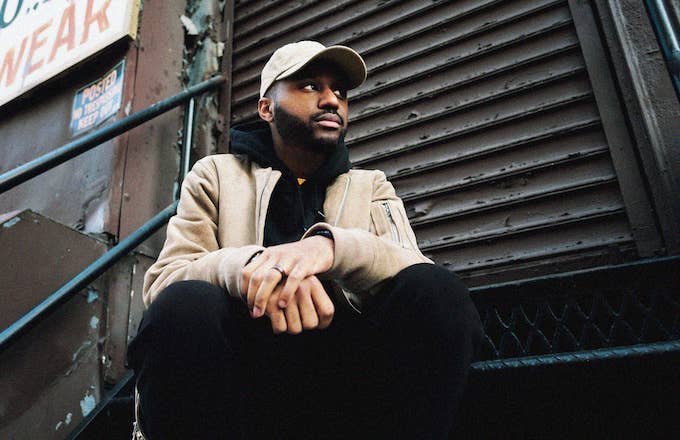
Trust the process. It's a phrase that's been adopted in some form or another by the 76ers, Jeezy, and hustlers of every kind. It comes in handy when shit hits the fan or, less dramatically, when things just aren't going the way you intended. It's like a placebo of motivation to stay the course when you don't know what lies ahead.
Seattle producer Sango knows his process well by this point, and his trust in it has led to success. He's known for being one of the faces of Soulection, the good vibes-powered radio collective that dominated SoundCloud and eventually found its way to Beats 1. He's released albums, mixtapes and EPs that span genres, from vibrant Brazilian baile funk to lush, low-key R&B, finding a way to connect with listeners of every kind. Sango has moved confidently through it all.
But while working on his new album, In the Comfort Of, he started to veer from the process. "I had probably 25 different versions of a beat or something like that," he said when we spoke on the phone in early March. "Just redone, redid, added some chords, changed the structure." He says he found his way back to the process by letting his guiding light, a higher power, speak to him. "I feel like God was like, 'Yo, chill out. It's gonna happen. You don't have to keep rethinking. Give it time, let it work.'"
In the Comfort Of was first announced in 2014. After three-plus years of working and reworking his beats, Sango is not just familiar, but comfortable with letting things flow into fate. The album dropped this Friday, March 16, and features artists like Smino, Xavier Omär, and Jesse Boykins III; Sango says he considers every collaborator on the album a friend. He talked with Complex ahead of the project about what to expect from it, the way he wants his supporters to listen to it, and what a successful album means to him.
How are you doing?
I'm good. I just got back home for a second from Brazil, I was there for about two weeks.
How was that?
It was great. We were out shooting a video for a song that's on my album. We were out there with some friends that I knew from a while back. Just met up with them. I did some shows, as well. It was a much-needed trip.
How are you feeling about the album? Do you have everything knocked out, do you still have stuff to do?
As far as paperwork, a few people have to sign, but that's pretty much it. The music is done—the music's been done for a minute. After I made the music, I had to like, find the people, find the right sound for it. Recruit people onto the album. That took almost a year.
Oh, wow.
Yeah. It was hard. When you're a producer, obviously, you don't sing or rap. Some people do, I don't. So it was just like, "Aight, what's next?"
How did you decide on those collaborators?
Honestly, I made two lists. I made a list of who I realistically think could be on the album, then like, long-shots. I sent those lists off to my manager and I guess to myself as well, and we worked on getting those people. The majority of the people on the album are friends. Actually, everyone on my album, they're friends, or I'm just meeting them throughout the industry. Naturally, that's the best way. None of them were really forced. It was like, "Yo, we got this singer, what do you think about it?" It was never like, "Yo, I got a album, and you gotta be on it!" It was only hard because of the timing, you know? You gotta make sure everyone—the creative process, you don't want to force anything. So I let people just take their time on it.
You announced this album at least three and a half years ago. So what have the last three and a half years been like?
A lot of idea building. Creatively, I've been producing so many different things with so many different people. Just proposing these ideas and like, creating new ideas for myself. Brainstorming future projects. The main thing a lot of people don't realize: music is like 75 percent relationships. We're people, we talk and have emotions, have a life. Music is like the result of that. That's why Frank Ocean took so long to make his album, because he had to live to write about things.
For me, in my situation, I was ready to release. I just couldn't do it. I knew what I wanted, but I didn't want to prematurely do something. I'm glad I waited because I have five or six songs on my album that were like, super old. Like, four years old.
Have they been released or they're just old for you?
They've never been released. I have like two released songs that are out there, but obviously that's a work in progress. It's fun to do that just to see how people are liking the sound. I tried a lot of different things. Two of them actually ended up being on the album. I revisited those beats every year. I had probably 25 different versions of a beat or something like that. Just redone, redid, added some chords, changed the structure. I feel like God was like, "Yo, chill out. It's gonna happen. You don't have to keep rethinking. Give it time, let it work." So I just let it happen. Finally, it's coming out. The album's coming out on my wife's birthday.
So, In The Comfort Of. In the comfort of what?
Exactly, I'm glad you said that. It's like, the title's an unfinished sentence. It's literally up to you to make that decision, what it's about. The idea of the album came about because I was kind of tired of hearing music that sounded like money. You hear music sometimes and it just sounds like it's a way to get money. "Okay, this'll do well on the radio, this'll get a lot of streams, it's good for the clubs" or what have you. And then, obviously, you listen to the album of that artist, there are real songs. They might have a lead single about something, but if you dive into the actual album, it's their whole life. That's what I wanted to capture, as an artist or a listener.
We have these things: I like to say salt and sugar. We live life with the salt, and we live life with the sugar. Salt is like the bad things, sugar's like the good things. But too much of both can harm you. I wanted to find the balance. I wanted to pretend I was the listener and figure out what I wanted to listen to. Like, if I didn't make beats or if I wasn't an artist, what would I like to listen to? And I would like to listen to really comfortable music that makes me think about something that I go through every day.
So I pulled from my life and used those as examples. My parents got divorced, so there's a song about divorce. Not even like, breaking up, something that's deeper than that. This is a divorce: how do you talk about this on the album and not have it being so cliche, "I need you back, don't leave me." Jesse Boykins III wrote the song ("Twogether") and he's talking about all the things we did, we've done. How when you take back another person, how much you have to relearn about another person, how you have to redo everything you had. It touches your heart a little bit.

I have another song with Xavier Omar ("Sweet Holy Honey"); it's about not having sex, straight up. Honestly, sex too soon could tarnish a relationship, because it's the thing you most protect. You don't want to just give it away immediately, unless you really feel like that, but you gotta know that you're gonna sacrifice the relationship. There's a possibility that relationship won't last. So Xavier's writing about waiting, what a man goes through. Something's that's painful, not even sexually, just like, "Yo, I'm in pain. For something that's good."
I designed the album for you to delete songs if you really just don't feel it, or you could play it out of order. It's really just an album for a person. It's an album, it's yours, and you can have that.
To kind of backtrack, the album has been a work in progress for three and a half years. Why were you able to come out with De Mim, Pra Você before In the Comfort Of?
With that type of music—like more or less experimental—that's me being a producer. When I release music, I wanna expand the possibility of new sounds, and that's something I experiment with: Brazilian music, Brazilian funk, everything Brazil. So that was like my experiment. It honestly became a part of me.
And people, they naturally can tell an album from me or like a side project, or a mixtape, or a beat tape. Like when Drake did Views, they could tell the difference between that and If You're Reading This It's Too Late. It felt like an album, the way it's presented. I could have done more of that.
What is your favorite song on this album?
My favorite song is "Mateo 2.19," I made that song when my son was born. I have one son. If you name a song after your son, that's your favorite one. That takes the cake. I remember I made that beat on the kitchen counter, putting him to sleep, and then my wife was like, "Okay I'm gonna go on a walk, I'm gonna bring him in a little pouch." So I was like, "Alright, bet, I got 15 minutes." So literally, they leave, I come up with some chords, they come back, the beat's halfway done. Later in the year, I took it to Dave B and Romaro Franceswa and we recorded the song in Seattle. The song was about the youth, the city, how we can protect our youth, and keep ourselves connected to our youth. So it's really a song about my son, straight up.
What would make this a successful album in your eyes?
If someone came to me and was like "Hey, I heard this song about X Y and Z, and this is how it made me feel, and it helped me. Now I'm here telling you this, and I wanna thank you." That's the ultimate thing. I'm here making music to help people—that's my main goal. Some people like making music cause they wanna have fun. They wanna make people dance. If that's how you wanna go about your art, so be it, you have no constraints. But my way of doing it is service, acts of service, acts of helping people, obviously having fun. But that's like the ultimate thing.
What legacy do you hope to leave behind with your music?
I hope to show other musicians that it's a good idea, it's okay to live a life where you're surrounded by people that can inspire you. I'm an avid believer in support systems, that shows in my music. People can see and hear—they know I'm married and have a wife and have a family that loves me. I have friends, and my friends help me grow. That's a legacy I wanna leave: the legacy of togetherness and support systems to better your career slash art.
"Sango lived a life where he put his family first, stayed consistent with his friends, asked his friends what they needed, asked the people who listened to his music what they like to hear from him."

